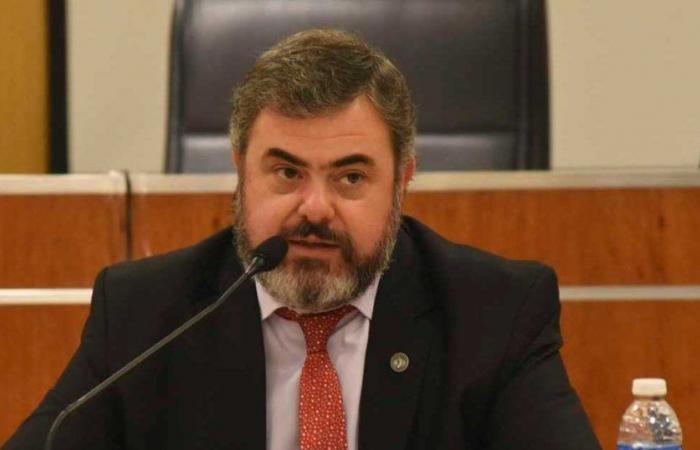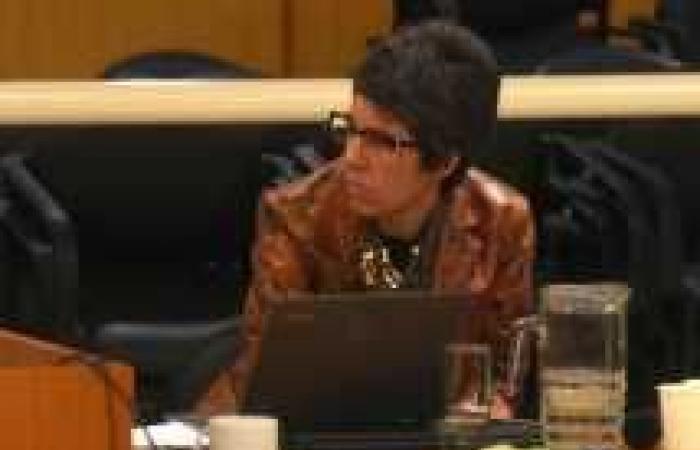Corruption of minors, scams, excessive delays in sentencing and extreme gender violence were some of the causes of dismissal in the last decade in the Judicial Branch of Río Negro. The Judicial Council is at the top of the statistics compared to other provinces. In a sign of good health: the control over the behavior and speed of the magistrates is exhaustive.
A crowd of women gathered at the doors of the Viedma courts on March 27, 2017 to follow the ruling against former judge Carlos Bernardi, accused of sexually abusing girls in a vulnerable situation.
Around noon, a court sentenced him to five years in prison for the crime of corruption of minors. Months earlier, in 2016, the Río Negro Judicial Council had dismissed him in what is so far the most serious case of conduct by a judicial official in the province. It was an unprecedented scandal for the Rio Negro justice system. which had a strong impact at the national level.
But there were others several causes that shocked public opinion and they had the same outcome. Also in 2016, the dismissal of Roca chambermaid Diego Broggini accused of delaying sentences.
They attributed delays in six amparo actions, six files of small claims proceedings and 58 cases in which he intervened as a judge of Chamber II of the Labor Chamber, in addition to six files in which he intervened as a judge of the same Chamber, with second vote. He is lto the same accusation that the recently suspended labor judge makes today by Viedma Gustavo Guerra Labayén: delays in sentences with risk of loss of jurisdiction.
The case of former chambermaid Carlos Villa Llanos is also well remembered in the legal world. He was dismissed in 2013 for behavioral disorders. He had been reported for injuries and death threats in the context of gender violence by his partner. He even tried to take a computer from the Judiciary after the first suspension.
The vote among the councilors was tied and was defined by the double vote of the then head of the STJ, Enrique Mansilla. As happened with Bernardi, he was convicted in criminal court, to 2 years of suspended prison. Of these names, Vila Llanos is the only one that is still active and recently participated in two trials with a lot of social impact in the region: the murder of Facundo Castillo in Cipolletti and the fraud case against Ipross in Roca: In both he served as defense.
Unlike Neuquén, where the members of the Judicial Council have a salary, in Río Negro is a free job. The Judicial Branch pays the salary of a secretary and a minimum staff of employees who are in charge of processing the competitions.
More cases
A well-remembered case and one of the few with a unanimous decision was the dismissal of former judge Guillermo Leskovar Garrigós de Roca in 2006. The magistrate was a lender and a former judicial employee denounced him. “Accused of having acted greedily, without humanitarian purposes, where what is reprehensible is his excessive attempt to collect the loan and purchase bonds from employees of the Judicial Branch to which he belongs,” says part of the Council’s resolution.
It was the second dismissal in Río Negro, eight years after the case of Fernando Bajos in 1998. Bajos was a criminal judge in Roca and was impeached for the investigation into a double homicide in Río Colorado.
In a report published by the STJ, it was revealed that between 1996 and 2017, 19 political trials took place. within the scope of the Rio Negro Judicial Council. Six of them ended in suspensions of between 3 and 60 days. Four others culminated in the acquittal of the magistrates or officials subjected to process. One judge was warned and eight were dismissed.
“The explanation of this phenomenon requires multiple approaches and exceeds the legal scope,” said the then president of the STJ, Ricardo Accarian, although he did not rule out that among the variables to take into account are greater citizen participation and knowledge and the acceleration of what are called “parallel trials” carried out in the media and public opinion.
Recent history marks an intense flow of investigations against judicial officials that pass through the control of the Judicial Council, the body in charge of reviewing the behavior of magistrates.. In December 2020, Judge Daniela Zagari was suspended for 50 days for his performance in the investigation of the murder of Atahualpa Martínez Vinaya, while he was a prosecutor in Viedma.
A few weeks ago, the first political trial of 2024 was resolved: the dismissal of Roca Family Judge Moira Revsin who was accused by a large part of the court staff of mistreatment and harassment. Despite the apologies that the lawyer made in the jury, the court had no mercy on her and expelled her from the Judiciary. In addition, prosecutor Jorge Crespo referred the proceedings to the prosecutor’s office to investigate whether she incurred any criminal offense.
She is not the first judge to be dismissed: in 2021, the multi-jurisdictional judge of El Bolsón Erika Fontela was removed from office due to poor performance in her role and serious behavioral disorders: by majority, 6 to 2. Another woman, Judge María del Carmen García, was dismissed due to surviving mental incapacity..
For the Council of the Judiciary it was almost a procedure because the magistrate came from an extensive psychological leave as a result of the investigation into the femicide of Autumn Uriarte. On medical advice, he did not even appear at his own impeachment trial. She later sued the State for having overloaded her with work, although the STJ did not grant her any compensation.
In 2018, the Council suspended prosecutor Daniel Zornitta for 60 days who, on Women’s Day, posted on his Facebook: “you can dedicate yourself to cleaning, cooking and ironing! “They have all day.” They accused him of poor performance and serious behavioral disorders.
2021 was the year with the most political trials in the province, in addition to the dismissal of Fontela, the Council fired the criminal judge of Guarantees of Villa Regina Federico Dalsasso. He also suspended the defender of Villa Regina -Ana Gómez Piva- for 25 days and an official from the same organization -Cristian Klimbovsky- for 15 days for having “unduly restricted” attention to the public. Both without pay.
In November of last year, the head of the Decentralized Ombudsman’s Office of Río Colorado, Gerardo Grill, received the same sanction: 50 days without pay.
Currently the strongest cause is against Guerra Labayén. In addition to the summary that was initiated against him, legislator Lucas Pica requested a new report that was referred to the audit to determine if he incurred another offense with a series of failures that also splashes his colleagues on the court: Rolando Gaitán and Carlos Marcelo Valverde.
In these resolutions, the Viedma Labor Chamber questioned the work of lawyers who are part of the State but also in cases against the Executive Branch.
Another ongoing investigation, which Pica also requested, is against Cipolletti’s public defender Silvana Ayenao for leaking sensitive information in the case of the femicide of Agustina Fernández. In this procedure, the behavior of Cipolletti’s chief prosecutor, Santiago Márquez Gauna, is also investigated.
For some time now, the STJ has increased controls, especially with resolution times.. The highest provincial court resolves cases in almost record time and with that standard demands the same response from the rest of the agencies. The role of the auditor Juan Manuel Montoto Guerrero is central in this control.
In fact, the official has almost all the Labor and Civil Chambers of the province with recovery plans. He also went to a Cipolletti Civil Court. Without going any further, a Roca waiter resigned because he knew that he would not be able to evade Montoto’s controls. There was speculation that Guerra Labayén was going to go the same way but the judge responded to the attack and He brought his two colleagues to the field of confrontation.
The Cipolletti judge who resigned after being acquitted
Pablo Iribarren, the judge of Cipolletti’s triple crime, emerged victorious from the impeachment trial. Although he had been charged with various chargesnot all of their behaviors could be demonstrated and the Judicial Council acquitted him.
Former governor Arabela Carreras y Broggini participated as a legislator in that trial to represent the judges.. Iribarren left the jury empowered and resigned from his position as judge. Since they did not prove the accusation, he could have easily returned to court. Since then he has practiced his free profession.
The judge of Criminal Execution of Roca, today defender, Juan Pablo Chirinos left with a suspension in a trial whose accusation could have ended in dismissal. The Judicial Council resolved to suspend the execution judge of Roca for 30 days, Juan Pablo Chirinos, for finding functional responsibility in one of the attributed causes, while also unanimously acquitting him in two other cases.
The magistrate was accused of poor performance in his duties for authorizing the temporary departures of Jonathan Luna and Ramón Geldres, who killed the Cipoleño merchant Claudio Araya. Jonathan Luna is the young man who obtained authorization to leave his place of detention in Roca, He escaped and then murdered 12-year-old Micaela Ortega in Bahía Blanca.
They also accused him of a poorly carried out sentence calculation that left a man named Lara detained longer than expected. Unanimously, the Roca magistrate was acquitted in the Geldres and Lara cases. In the Luna case he was suspended for 30 days.
In the Execution jurisdiction, Cipolletti judge Lucas Lizzi also escaped impeachment. His file reached the Judicial Council but had the political support of the legislators and the Bar Association. The STJ voted to send him to the jury but was in the minority.
Lizzi was in the eye of the storm after the irregularities noted in the control of the execution of the sentence of Matías Baldebenito, who was on parole when he murdered the rugby player Joaquín Vines. Auditor Montoto has him in his sights with several investigations, although none conclusive.
Another Cipoleño who avoided impeachment was Guillermo Moyano, at that time judge of Choele Choel. They accused him of delaying justice and poor performance but he resigned from his position when the process already had a trial date.
He then tried to enter the Judiciary and entered several competitions. In the last one, he gave up his application for judge of guarantees due to his commitment to the Bar Association that had summoned him, free of charge, to join the Council of the Judiciary for criminal matters. Since then he has been a substitute director.









